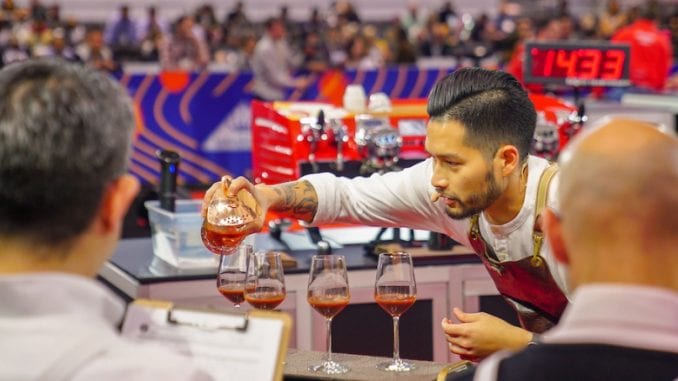
Mikael Jasin is the barista champion of Indonesia and this year’s fourth-place finisher at the 2019 World Barista Championship—and he certainly doesn’t like to take the easy way out!
BY ASHLEY RODRIGUEZ
BARISTA MAGAZINE ONLINE
Photos by Lanny Huang for World Coffee Events
Mikael Jasin trained like a champion. He is the current barista champion of Indonesia and placed fourth at this year’s World Barista Championship in Boston—and Mikael has put in the work. Practicing from sunrise to sunset, Mikael, who works for Common Grounds Coffee Roaster & ST. ALi in marketing and quality control, approached competition with an immense amount of self-awareness, and tailored his preparation techniques to meet his needs.
Mikael had to be focused because he presented a ton of information and skill in his routine. Focusing on “purpose-driven fermentation,” he served three different coffees, all with modifications made during the fermentation process. In this interview, we learn more about what motivates Mikael, and maybe whether or not we’ll see him again on the competition stage …
Ashley Rodriguez: Tell us about how you got into coffee—what was your first coffee job and what do you do currently?
Mikael Jasin: I got into coffee while I was studying in Melbourne, Australia, in 2012. I was working in retail and was bored of how it was. Then I decided to drop my resume to my daily coffee shop called Manchester Press. They took me in as a floor staff. I spent about six months working the floor and doing everything from washing dishes to cutting oranges. After constantly bugging the senior baristas to teach me how to make coffee for six months, they finally let me be on the machine for 30 minutes a day before closing time.
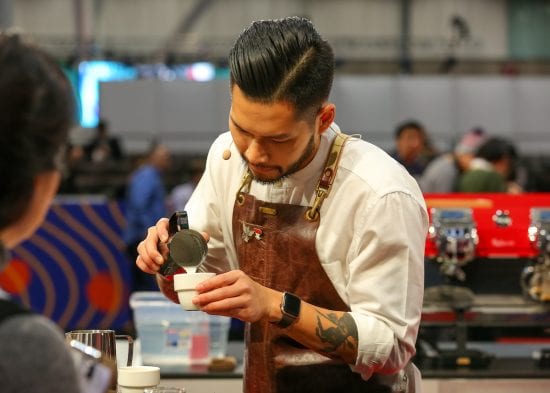
I currently do a double role at Common Grounds Coffee Roaster & ST. ALi family Indonesia. I have a post-grad in marketing so I’m in charge of the marketing activities that we do here: from selling limited-release Geshas to making avo on toast sexy again. My second role is as quality-control manager for all of our stores in Indonesia. This includes production roast QC, coming up with barista training module, jumping from store to store to QC them, and my favorite is always to go to farms and see how our greens are produced.
What prompted you to compete? Have you competed in other competitions before?
I like to learn and geek out about whatever I’m doing, and I see coffee competition as a really good vehicle to force myself to learn. I was living in Melbourne when we hosted the 2013 WBC, and I remember seeing Matt Perger on the livestream killing it. That was the first time I saw a coffee competition, and that sparked my interest. I knew competing in barista competitions was tough (English is my adopted language and back then I was only speaking OK English), so in 2015 I decided to join the Australian Coffee In Good Spirits (CIGS) competition, with joining the barista competition as the bigger goal. To my surprise I came in second that year (out of six people lol), and that motivated me to compete even more. The next year I competed in both the Australian CIGS and barista competition. I came in second again in CIGS and ran 36 seconds over time in the barista comp nationals.
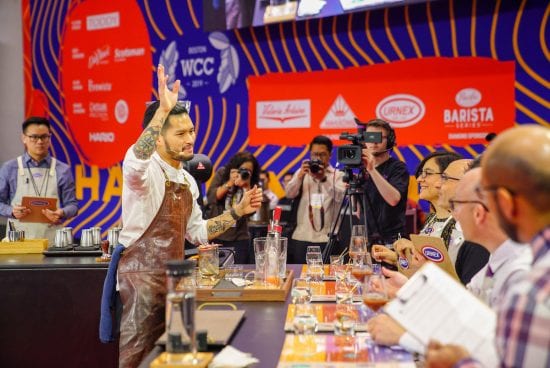
I then decided to move to my native Indonesia in 2017 to further my coffee career and get more serious with competition. I was lucky that Common Grounds has a very supportive environment and pushes everyone to compete as a way to [increase their skills]. I competed in the 2018 Indonesian Barista Championship and came in second again before finally winning it in 2019.
What is the specialty coffee scene like in Indonesia? Can you talk a little bit about what’s happening and what excites you?
The scene in Indonesia is very interesting! It’s different from Melbourne or similar parts of the Western world where there’s volume and it’s fast-paced. In Indonesia we have lots of smaller coffee shops and our customers tend to sit in longer. So the culture is less of a takeaway vibe but more of an interactive kind: The customers enjoy the theatrics of latte art, manual brew, and general coffee-making, and the baristas actually have more of a chance to engage with their customers.
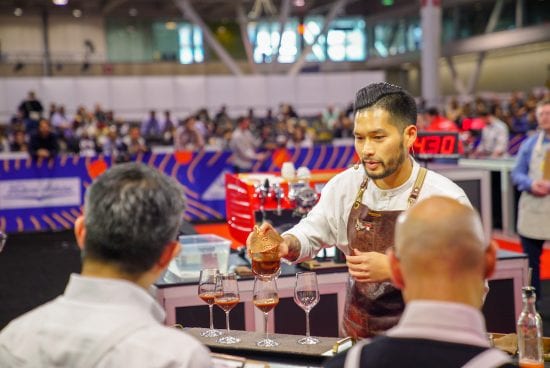
Also, being a producing country, we have a lot of access to interesting / not-so-popular varieties of Indonesian coffee. This allows the baristas and customers to explore what they like, and I feel like the feedback chain loop from consumer to farmer happens a lot quicker.
What excites me is the improvement that our local industry is experiencing. These days, information about coffee is readily available for everyone. Baristas can easily tune into a livestream and learn more about techniques and competitions. Also, farmers can easily share knowledge with their peers in other countries and improve their crop quality. I’ve seen exponential growth in quality because of this, and I can’t wait to see what happens in the next few years.
What coffee did you use for your routine? What was your theme and how did you differentiate yourself from other competitors?
I used three different coffees for my routine, and it has a lot to do with my theme.
I’ve always been fascinated by fermentation and how it changes and adds so many different layers of flavor in anything from food to wine to of course coffee. So I picked that up as a theme all the way from our regionals. However, for the worlds we needed to tighten up this concept and give our own value proposition. Obviously, being from a producing country, the dream is always there to use Indonesian coffee. We realized that this could be our point of differentiation, but we had to be very objective in choosing which coffee is worthy of the world championship level, if any.
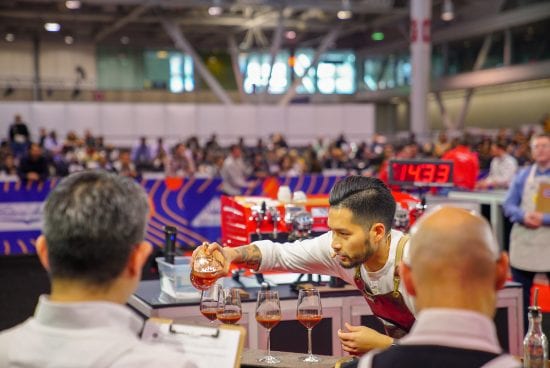
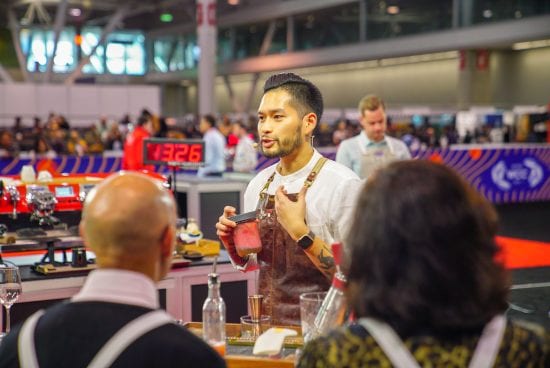
I was lucky enough to be part of a project a while back where we did, for the first time, the carbonic maceration process in a couple of Indonesian coffee varieties. We’ve always wanted to showcase this coffee in a bigger stage but were never quite sure when.
So fast forward to our preparation for the worlds, we knew that this could be our chance to start a conversation around Indonesian coffee and how it has improved exponentially in the last few years. Thus, we chose purpose-driven fermentation (through carbonic maceration) as a theme, and used three different coffees to highlight how the school of thought and process has been proven to improve coffees in any parts of the world when applied properly.
We started by highlighting a washed carbonic maceration Gesha from Finca Deborah in Panama that was produced by Jamison Savage for espresso. Then we chose a whole-cherry carbonic maceration Ethiopian heirloom processed by Project Origin for our milk. And finally we highlighted the Indonesian carbonic maceration from Wahana Estate in Northern Sumatra that was produced with the help of Jamison Savage.
How did you prepare? It seems like you work at a coffee shop that produces a ton of champions—did you feel any added pressure because of that?
I approached this coffee competition like the Olympics or a UFC world title fight. And what I noticed from those world-class athletes (and some WBC finalists) is that the best of the best wake up well before dawn and work both on their craft and their mind for 18 hours a day. So that’s pretty much what I did. I’d wake up around 4, go for a run and then go to the roastery to train. Then I’d do my ‘day job’ before going back to the roastery in the late afternoon to train / taste coffee / rehearse my routine until 10 p.m. I’m a slow learner, so I needed those long hours to really make things click in my head.
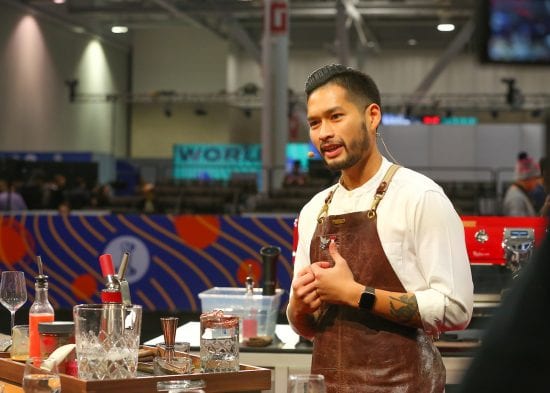
In regards to working at a place that produces a ton of champions, I actually feel very lucky to be a part of it rather than pressured. Their experience on the world stage really helped me prepare my run to the WBC. Even though 2019 was our first time in the final, this wouldn’t be possible without the years of learning that the champions before me had.
Did you have any expectations going to WBC? What were your goals and how did you feel placing fourth?
Going into WBC I honestly just wanted to do my best and have no regrets when it was all said and done, however far that was going to take me. So when we came in fourth, it was a mix of different emotions. Indonesia has never been this far in any World Coffee Events competition, and to be the first team to do it was amazing: it gives me chills every time I think about it. However, it also showed us that what we thought was unattainable is now possible, and we’re itching to do better next time.
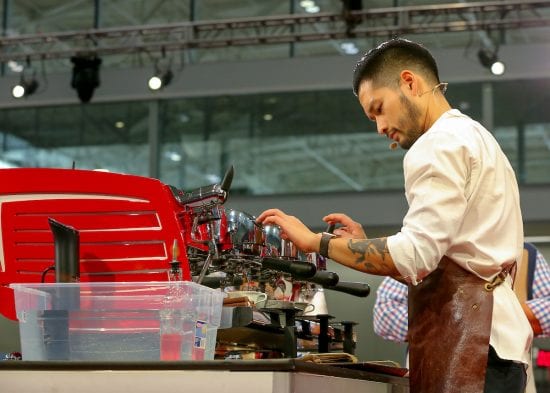
What advice do you have for future competitors?
If you ever thought about competing, you should do it. You’ll find yourself through the journey and make some really good friends along the way. It’s not an easy road, but you’ll benefit so much from it.
Will you compete again?
I like to make my life difficult. So, hell yeah.
What do you want folks reading this interview to know about you?
Two things:
First, that I am the product of my team. I wouldn’t be able to do what I did without the sacrifices of people who helped me get there—anyone from my family to my closest friends to my colleagues and my peers in specialty coffee.
Second, that there’s empowerment in failure. I have ‘failed’ many times in barista comps and in life in general. However, I always have a positive look towards it. I internalize that loss and try to learn as much as I can from the experience and be a better person next time. I only hope to light a spark in others who are dealing with loss or failure. Hopefully that shows them that as long as you keep on pushing through, no matter how hard it is, that there’s light at the end of the tunnel.

